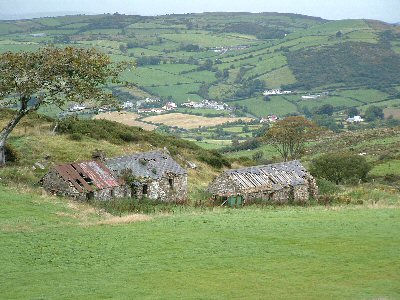The last two decades of the nineteenth century saw pivotal change that presaged the revolution to come. The founding of the Home Rule League in 1873 began a decade of agitation centring on this, and on the land question, under the leadership of Michael Davitt of the Land League.
Parnell led eighty-five Home Rulers at Westminster. John F Small’s election as nationalist M.P. for South Down followed the reform and extension of the franchise in 1884. The introduction of a bill by British Prime Minister William Gladstone in 1886 to grant Home Rule to Ireland precipitated a crisis. He had already set out on a course to settle the land question in Ireland. There was also the beginning of a Gaelic revival, and the Fenian question had never quite gone away. Yet all the while mass emigration continued apace and those who stayed on to work the land continued to labour under iniquitous landlords imposing rack rents for land that was never rightfully theirs.
Although a whole new system of Local Government was mooted and was to be effected within a decade, the people were still then subject to appointed Local Government Board Inspectors. One such was Mr Richard T. Hamilton Esq. resident of Newtownards who held property in the townland of Cornonagh, Crossmaglen. Sustained campaigning under the Land League had effected, countrywide, some rent reduction from the exorbitant rates set in better times. Hamilton, whose land was – according to an anonymous contributor to the Dundalk Democrat of 1887 – equally divided between rocks and bogs, had originally acquiesced in a 20% rent reduction but followed a different path after 1883 when he appointed H. D. M. Barton of Dundalk as his agent. The significance of this appointment is that the agent was a relative of a previous land agent in the area, Mr Robert Lindsay Mauleverer, who was murdered on the 23rd May 1850 at Crievekeeran near Crossmaglen. Evicted tenants later alleged that they were the innocent victims of his vengeful spree.
Describing the land, and the tenants’ campaign for justice, the letter writer explained, ‘In many cases they had to carry earth a mile or more on their backs to cover the bare and barren rocks in order to make them fertile. Even so, only small patches of a few perches can be laboured. The rent they are forced to pay comes not from the land but from the wages of children who often go into service aged ten or eleven or from fathers or grown-up sons who labour for wages in England or Scotland.’
No appeals for clemency were entertained. Mr Jeffers of the Board recommended the intervention of the Relieving Officer for the Dundalk Poor Law Union within which district Cornonagh lay. In the first week of August 1888 he reported to the Board that Hamilton, amid torrents of rain on a Friday and Saturday in July had eleven of his tenants evicted. The family heads were: Peter Conlon, Mary McGeeney, Thomas Lavell, Matthew Herity, Michael Morgan, Patrick McGeeney, Sarah McDonnell, Patrick Morgan, Patrick Murphy and Owen Trainor.
They were entitled to outdoor relief for a period not exceeding one month. The tenants were ordered to pay legal costs and being homeless and destitute, had their miserable belongings sold towards defraying this cost. Nor were they allowed to harvest the crop they had sowed on their land.
The present writer is ignorant of their fate beyond this point but it must be assumed some, if not all, ended up as paupers within the workhouse walls.
The grander scheme of nascent political change surely meant little in their miserable lives, as so often happens to the poor and the powerless.
… Crossmaglen 1838 ? …
